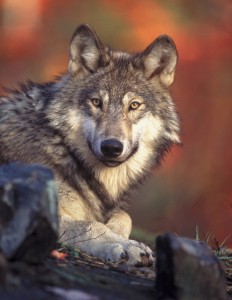[toc class=”toc-right”]

Wolves avoid humans, but encounters sometimes occur when humans and wolves use the same habitat. Wolves that approach people, buildings, livestock, or domestic dogs are either habituated to humans, unhealthy, wolf-dog hybrids, or former captive animals. Wolf-dog hybrids can be especially dangerous because they lack the shyness of wild wolves.
Even though wild wolves rarely threaten human safety, they are wild animals that should be respected and never approached.
Report all suspected wolf and wolf track sightings to the Washington Wolf Reporting Hotline at 888-584-9038.
At your home or ranch:
Never let wolves become comfortable around you or your home, or they may lose their fear of people.
- Never feed wolves or other wildlife.
- Garbage can attract wolves and other wildlife. Keep garbage in a secure location.
- Do not leave any food outside, including scraps, pet food, or livestock feed. When possible, feed animals inside.
- Keep dogs under supervision. Wolves can be highly territorial toward other canids.
- Wolves can be scavengers, so bury dead livestock and pets.
- To prevent livestock depredation, consider the following:
- At night, use range riders or dogs with cattle and herders or dogs with sheep.
- Remove sick or injured livestock.
- Delay cattle turnout until after calves are born and weigh at least 200 pounds and after elk calves/deer fawns are born.
- Avoid areas near wolf dens and wolf rendezvous sites during spring and summer.
- Use permanent or portable fencing, including electric fencing.
- When possible, keep livestock well-fenced and closer to human dwellings, wolves avoid these areas.
While camping, hiking, and hunting in wolf country:
- Never feed, approach, or encourage wolves to come near, or they may lose their fear of people.
- Stay away from fresh wolf kills, dens, and rendezvous sites.
- Keep a clean and orderly camp. Cook and store food away from sleeping areas. Suspend food, toiletries, garbage and other loose objects on a rope between trees, or in secured kayak hatches, out of reach of wildlife. Wolves have been reported removing personal and other non-food items from campsites.
- Do not bury garbage. If you pack it in – pack it out!
- Wash dishes in a container and dispose of grey water.
- Near the coast use areas below high tide mark, away from camp, in an area of high tidal exchange for toilets – do not use the upland areas, wolves will feed on human excrement.
Wolves and Dogs:
- The gray wolf is the ancestor of domestic dogs. They are actually the same species, Canus lupus. That is why wolves view dogs as competitors or territorial intruders and have attacked and killed them. Owners of dogs need to be aware of the potential risk to their dogs if they are in wolf habitat, especially when guarding or herding livestock, hunting, accompanying hikers, or running at large.
- In areas occupied by wolves, homeowners should not allow dogs to roam at large or leave dogs outside overnight unless kept in a sturdy kennel. Dogs should be kept on leash or in visual/auditory range and owners should vocalize frequently, including use of whistles. Dogs should be trained not to chase or approach wildlife and to return on commands. Homeowners should not leave dog food outside and avoid feeding wildlife near their homes.
- Hikers should consider leaving their dogs at home when visiting sites with wolves. Hikers with dogs should keep them on leash or closely controlled. Hikers should make noise and equip dogs with bells or other noise-makers to alert wolves to the presence of people. If a wolf is encountered, bring dogs to heel and leash them, and stand between them and the wolf; wolves avoid humans and this often ends the encounter. Don’t try to break up a physical fight between a wolf and a dog.
- Hunters who use dogs in areas where wolves are known to exist (either to find game birds or, where allowed, to find other game animals), should avoid releasing dogs in areas with fresh evidence of wolves (tracks, scat, howling, etc.) Stay in close range of hunting dogs, communicating with them by voice or whistle, and use bells or beeper collars on dogs to alert wolves to the presence of people. Hounds used to tree game should be released only on fresh sign to avoid long chases, and when treeing game, reached as soon as possible so they are not unattended for long.
- Be alert and aware of the potential risks when recreating or living in wolf country. To prevent problems with wolves and other wildlife, always keep a clean camp or home site to avoid attracting wolves that might scavenge for food, or more likely prey upon other animals that are attracted to both intentional and non-intentional feeding opportunities. (Source: USFWS 2007)
In your community:
- Remind your neighbors to never feed wolves and other wildlife.
- Promote the reduction of potential wolf food sources in and around your community.
- Notify authorities about wolves that seem comfortable around people, seek human food, or frequent human areas. Early intervention can keep a problem from getting worse.
